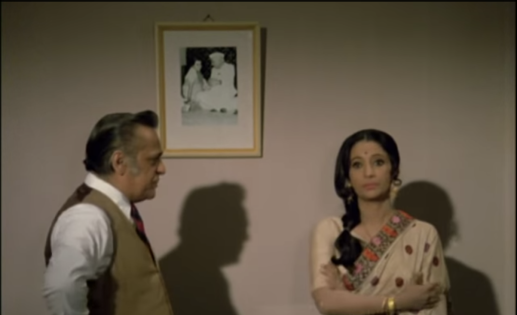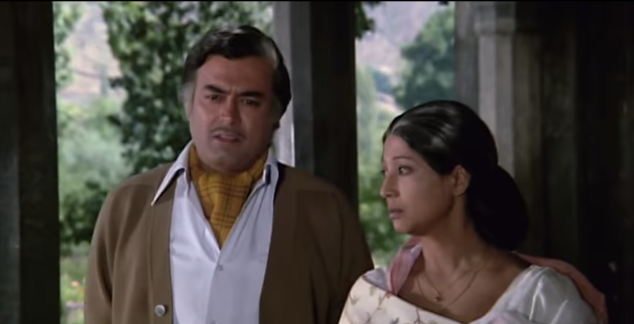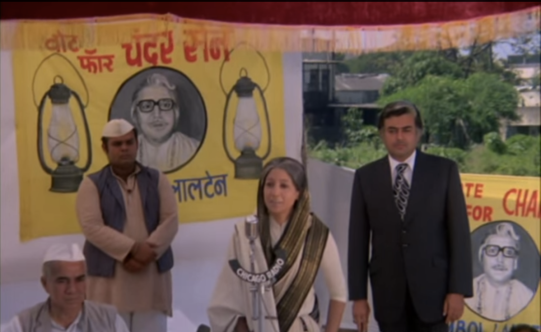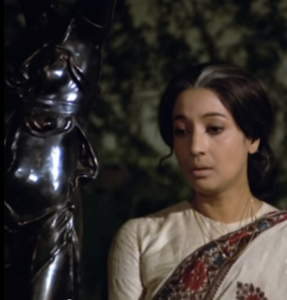Directed by the renowned lyricist Gulzar, Aandhi stirred up quite the controversy after the film was released in 1975. Shortly after the release of Aandhi, India found itself in the midst of a national state of emergency instituted by Prime Minister Indira Gandhi in response to the deep-seated political unrest and instability that had emerged across the nation. The 21-month Emergency of 1975-1977 is often viewed as one of the darkest eras in the political history of post-independence India: corruption, censorship, and the suspension of civil liberties threatened to compromise the basic principles upon which the nation’s democracy had been built. In this context, it’s not surprising that Aandhi was banned by the government during the Emergency on the grounds that the film’s protagonist bore an inappropriate resemblance to Mrs. Gandhi. As a result, certain scenes depicting the protagonist drinking and smoking were re-shot and an extra scene in which the protagonist tells her father that she idolizes Indira Gandhi (“ye hii to mere ideal hai.n“) was included to separate the film from real life. Although the parallels in appearance, mannerisms, and even the film’s title (Aandhi, meaning storm, rhymes with Gandhi) are undeniable, Gulzar explains in an old Filmfare interview that he never intended to base this film on the life of Indira Gandhi:
“Contrary to popular opinion, my story wasn’t based on Indira Gandhi’s life. It had nothing to do with Indira-ji. She was just the role model for the lady politician. Frankly, who better could there be? She was such a dynamic lady.”

Suchitra Sen tells her father that she idolizes Indira Gandhi in a flashback scene that was added to Aandhi (1975) after the film was initially banned by the government.
With inspiration from a novel titled Kali Aandhi by Hindi author Kamaleshwar, Aandhi (1975) depicts the story of Aarti Devi (portrayed by Suchitra Sen) as she struggles to balance her professional ambitions with her quest for personal gratification while navigating through the volatile world of Indian politics. While traveling on the campaign trail, Aarti is caught by surprise when she runs into her estranged husband JK (portrayed by Sanjeev Kumar), who happens to be the owner of the hotel where she is staying currently. Nine years ago, the call to public service compelled Aarti to eschew her domestic duties and leave her husband and daughter in order to pursue her dreams of becoming a politician. After their unexpected reunion, Aarti and JK cultivate a tender but awkward relationship as they reminisce about memories from their past and come to realize that they still have unresolved feelings for each other after all these years. Through an artistic use of flashbacks, we learn about the development of Aarti and JK’s early romance, the disapproval of their marriage by Aarti’s father, and the eventual breakdown of their relationship. Their domestic conflict evolves into an Abhimaan-esque clash of egos and personalities, and they eventually decide to part ways after several failed efforts to maintain a happy marriage.
Ultimately, Aandhi illustrates the complexities of an evolving relationship between two individuals who share mutual respect and affection for each other but are unable to reconcile their differences to converge seamlessly on the same path. In addition to providing a mature and realistic view of human relationships, Aandhi sheds light on the unique challenges that confront Indian women in positions of power as they attempt to balance their professional and personal lives. Although Aarti wins her election at the conclusion of the film, this victory is made bittersweet as she grapples with an unfortunate reality: professional success and domestic bliss were often mutually exclusive for Indian women of her time.

The Martand Sun Temple near Anantnag, Kashmir serves as a gorgeous backdrop for this classic song from Aandhi (1975).
In addition to Gulzar’s skillful direction and the captivating performances delivered by Suchitra Sen (her diction is excused!) and Sanjeev Kumar, Aandhi is remembered most often today for its soundtrack of stunning songs composed by R.D. Burman using Gulzar’s poetry. Each Lata-Kishore duet is a gem and serves to illustrate a different facet of Aarti and JK’s relationship in the film. In particular, the classic “tere binaa zindagii se koii” is a tender and wistful expression of regret and lost love. Without the frills of an elevated vocabulary, this song boldly questions: can living life without the one you love be considered a life at all?
Tere Bina Zindagi Se Koi Shikwa: Lyrics and Translation
tere binaa zindagii se koii shikvaa to nahii.n, shikvaa nahii.n
I have no complaints against a life without you.
tere binaa zindagii bhii lekin zindagii to nahii.n, zindagii nahii.n
Yet a life without you is not a life at all.
kaash aisaa ho tere qadamo.n se
I wish that, from your footsteps,
chunke manzil chale.n aur kahii.n, duur kahii.n
we could find a new destination; somewhere else, somewhere far.
tum gar saath ho manzilo.n kii kamii to nahii.n
With you by my side, there is no shortage of destinations for us to reach.
SK: suno Aartii, ye jo phuulo.n kii bele.n nazar aatii hai.n na?
Listen Aarti, do you see those things that look like flower vines?
darasal ye bele.n nahii.n, arabii me.n aayate.n likhii.n hai.n.
In fact, they are not vines. They are verses written in Arabic.
ise din ke vaqt dekhnaa chaahiye, bilkul saaf nazar aatii hai.n.
We should see them during the day. They can be read very clearly.
din ke vaqt yah saaraa paanii se bharaa rahtaa hai.
During the day, this whole place is filled with water.
din ke vaqt jab ye phuvaaare…
During the day, when these fountains…
SS: din kii baat kyo.n kar rahe ho? kahaa.n aa paauu.ngii mai.n din me.n?
Why do you keep talking about the day? How will I come here during the day?
SK: yah jo chaand hai na? ise raat main dekhnaa.
Do you see this Moon? Watch it at night.
yah din me.n nahii.n nikaltaa.
It does not come out during the day.
SS: yah to roz nikaltaa hogaa.
But the Moon comes out every night.
SK: haa.n, lekin biich me.n amaavas aa jaatii hai.
Yes, but the dark fortnight comes in between.
vaise to amaavas pandrah din kii hotii hai.
The dark fortnight usually lasts 15 days.
lekin is baar bahut lambii thii.
But this time, it felt much longer.
SS: nau baras lambii thii na?
It felt as if it were nine years long, no?
jii me.n aataa hai tere daaman me.n
I yearn to seek refuge in your bosom
sar chhupake ham rote rahe.n, rote rahe.n
to hide my face as I continue to weep.
terii bhii aa.nkho.n me.n aa.nsuuo.n kii namii to nahii.n
Are your eyes not clouded by the mist of fresh tears, too?
tum jo kah do to aaj kii raat
If you say so tonight,
chaa.nd Duubegaa nahii.n, raat ko rok lo
even the Moon will not wane. Please stop the night from passing!
raat kii baat hai, aur zindagii baaqii to nahii.n
We only have tonight, for the rest of our lives will not be shared together.
tere binaa zindagii se koii shikvaa to nahii.n, shikvaa nahii.n
I have no complaints against a life without you.
tere binaa zindagii bhii lekin zindagii to nahii.n, zindagii nahii.n
Yet a life without you is not a life at all.
*Female lines in red are sung by Lata Mangeshkar. Male lines in green are sung by Kishore Kumar. The dialogue takes place between Sanjeev Kumar (SK) and Suchitra Sen (SS).
Glossary
shikvaa: complaint; qadam: footstep; chunnaa: to select; manzil: destination; kamii: shortage, dearth; bele.n: vines; darasal: in fact; aayate.n: verses; phuvaare: fountains; amaavas: dark fortnight; pandrah: fifteen; baras: year; daaman: lap, bosom; aa.nsuu: tear; namii: moistness; chaa.nd: Moon.

After rumors circulate regarding her nightly meetings with Sanjeev Kumar, Suchitra Sen reveals to the public that she has been meeting her estranged husband in Aandhi (1975).
Did you know that this song was based on a Bengali melody originally composed by R.D. Burman for a Durga Puja album in the 1970s? Listen to “jete jete pathe holo deri” to hear this melody sung by the composer himself! When Gulzar heard R.D. Burman working on this song with Bengali lyricist Gauriprasanna Mazumdar, he enjoyed the song so much that he wrote Hindi lyrics for the tune so it could be included in Aandhi. When Gulzar inserted the iconic “nau baras lambii thii, na?” dialogue in between antaras of this song, he reports in the same interview that R.D. Burman was not pleased:
“So we kept the original tune for the mukhda, and he composed something else for the antara. But when I inserted some dialogue into the lyrics, Pancham scolded me, ’Do you have any idea of sur and taal? You cut in with your dialogue anywhere you want. Its not done!’ But we did it!”
They certainly did something right, as this song has become immortalized as one of Hindi film music’s most treasured creations. Thanks to our reader Raju for requesting this post! Until next time…
-Mr. 55


One of the truly immortal songs.
Wonderful back stories as always, you always do such great research! Love the song!
What a remarkable, insightful and absolute pleasure to read description of an iconic song! I had no idea that the tune was based on a Bengali song by RD Burman. How do you find such historic nuggets?? This was an utter delight for any Bollywood film and music lover to read – welcome back Mr. 55!
Dear Mr. & Mrs 55, Thanks for the new classic. A request for the song: Teri duniya se ho ke majaboor chala Main bahot door, bahot door Bahot door chalaTeri duniya se ho ke majaboor chala Main bahot door, bahot door, Bahot door chala from the movie “Pavitra Papi” With regards, Roy
Lata at her prime, what a classic. Even though I would have preffered Rafi instead of Kishore
Lata had notoriously fallen out with Rafi, around royalties and wouldnt perform with him. What a huge loss that was for that period.
This song might not have been as good with Rafi though, classics are classics for a reason, and they do not get better if you change anything about them.
Excellent selection – I am in awe of the research you do – thanks for providing such joy.
Do remain 55 for ever.
And may ur tribe keep increasing.
Nice Songs….There are two Songs also in Begum jaan Movie first is Woh Subah Arijit Singh and Shreya Ghoshal . and senond Murshida Arijit Singh
Please Upload
Dear Sir/Mam,
This is my all-time favorite songs. I came here to get help on the dialogues which come in between the song. Thanks for the complete meaning and the trivia.
You made my day.
Never got the bits, ….” Arbii mein Aayatein …..Phuhaare….” Thanks a ton!
beautiful song. Thanks for the translation, very well done. Made me appreciate in greater deapth..
Lovely song. Would have lived with it hundreds of times. Thirst never gets quenched. Frankly, am not all that …. to listen to Kishor Da. But I love this and other in Andhi.
And my Mother is always Soprano.
Great. Thank you.
May Allah bless every one.
What a beautiful article…hope you guys are still writing ❤